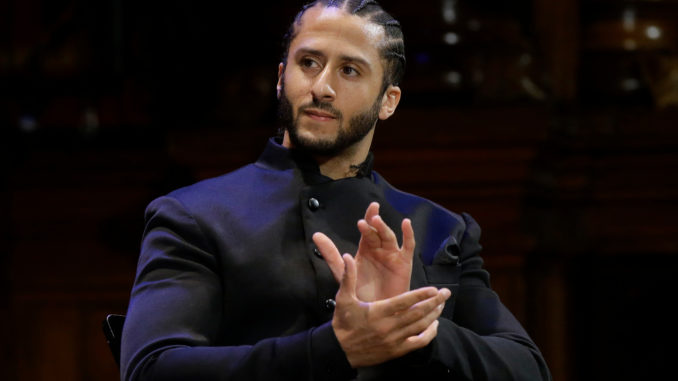
The announcement comes at a moment when politics, sports and entertainment are entwining in new ways, now converging at the country’s largest entertainment company. And on its face, it represents a shocking turnaround. Kaepernick’s protests, which began with kneeling during the national anthem and also included wearing socks that depicted police as pigs, created a legion of followers, a large number of detractors and a culture war that went all the way to the White House. He has been cheered, shunned and become, no matter one’s politics, a lightning rod. And Disney has long been careful in the extreme to avoid lightning rods.
Yet here it stands, embracing Kaepernick across its brands.
The announcement even arrived with official Walt Disney Co. bells and whistles; the press release came with comments not just from executives at The Undefeated, the socially minded ESPN-owned Web site that will help oversee the partnership, but hosannas from Robert Iger, Disney’s executive chairman. “Colin’s experience gives him a unique perspective on the intersection of sports, culture and race,” he noted.
The apparent meaning of the effort did not go unnoticed by experts. As the longtime media journalist Anthony Crupi pointed out, the deal marked “a reversal of the play nice with 345 Park Ave/Stick to Sports initiatives” that Disney and ESPN had long practiced, referring to the NFL’s New York headquarters.
The announcement also seemed to satisfy what the University of Virginia’s Carmenita Higginbotham, who teaches and studies Disney, told The Washington Post just last week was required of the company.
But the Kaepernick deal may also be less subversive than it appears. Kaepernick and his approach — which deployed a visually potent image to call attention to systemic racism and police misconduct — were in fact endorsed by Disney only after many entities had already pivoted to embrace the athlete during the past six weeks of Black Lives Matter protests. As a larger political movement has gone from marginal to mainstream — and, not insignificantly, as President Trump’s poll numbers suggest his waning ability to win this particular culture war or use it to his political advantage — it has made the former QB safe for a lot of companies, and ultimately for Disney.
The Kaepernick signing, in other words, says a lot more about the distance his message has traveled than how far Disney has come.
The league, in the aftermath of the kneeling movement he kickstarted, in 2018 even rewrote its rules to require players on the field to stand for the anthem.
But Kaepernick is hardly non-grata anymore. As protests against police brutality and on behalf of the Black Lives Matter movement took worldwide root following the police killing of George Floyd, they significantly changed Kaepernick’s standing and broadened his acceptance into places he’d never previously found it. Even Roger Goodell, the NFL commissioner who oversaw the anthem policy, released a video apologizing and endorsing Black Lives Matter.
Disney was hardly out front in working with Kaepernick even among other entertainment giants. Netflix, Disney’s sometimes more quick-footed rival, had announced a deal to produce a show based on his life a week earlier.
Even Trump appears to have decided Kaepernick is no longer a worthy target for his purposes. While the president continues to wage a culture war — just on Monday he tweeted criticism for NASCAR’s decision to ban Confederate flags and said Bubba Wallace should apologize for the noose “hoax” — he has dramatically changed his stance on Kaepernick. “If he deserves it, he should” the president said about landing a spot on an NFL roster. It was a far cry from his comments at a rally in 2017 that, upon seeing a player knee, an NFL owner should tell a coach to “get that…off the field right now,” using an obscenity. “Out. He’s fired. He’s fired.”
None of the Kaepernick or kneeling acceptance, for instance, speaks to how some of the constituencies that have softened on it will respond when he or others push the protests further, when it goes beyond a kneel to more overtly political messages about the government, about candidates, about the police. Or how Disney will react when they do. Already athletes are objecting to how the NBA, with which ESPN partners on a three-company $24 billion broadcasting deal, has managed the question of messages on jerseys when the league restarts later this month. (Philadelphia 76ers forward Mike Scott criticized the move on Monday as “a bad miss” the limiting nature of the process, in which players can choose from a handful of NBA-approved slogans but do no more.)
Nor, for that matter, does it speak to how ESPN and Disney will react when(ever) the NFL season starts and, say, Dallas Cowboys owner Jerry Jones, historically outspoken against liberal politicians and causes, chooses to end his recent silence. Or if ratings drop. Or in the event of many other developments that force a more difficult choice than signing a first-look deal with a valuable brand.
Disney, of course, is not in any way required to practice activism; as a publicly traded firm, it will make decisions on the basis of shareholders, not politics. But activists and academics are also within their rights to tamp down their enthusiasm about the move.
Some commentators on Monday did just that.
“This is more than offering platitudes, they’re spending money,” Todd Boyd, a University of Southern California professor and expert on pop culture and black history, told The Post of the Kaepernick deal. “But they’re also doing something that is within their own self-interest to do. He poses no real risk to their business, other than the money they’re investing.” Boyd noted that Kaepernick’s “iconic value is especially high at the moment.”

Be the first to comment